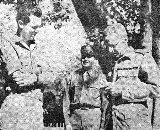
VOL. II NO. 13 REG NO. L5015 DELHI, FRIDAY DECEMBER 10, 1943
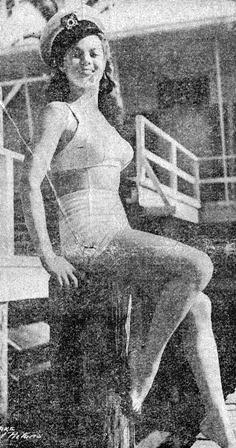 Delectable Dona Drake doesn't know a thing about sailing a yacht. But let's not quibble, men. Anything that enables the young lady to show here - ah - charms to such an advantage is sufficient excuse for us. At the moment, she's the Roundup's Girl With Whom We'd Like to Get Lost on a Yacht.
Delectable Dona Drake doesn't know a thing about sailing a yacht. But let's not quibble, men. Anything that enables the young lady to show here - ah - charms to such an advantage is sufficient excuse for us. At the moment, she's the Roundup's Girl With Whom We'd Like to Get Lost on a Yacht.
|
BY TENTH AIR FORCE
The 10th Air Force was all over the place this week, pounding again at Rangoon, swinging down to the Andamans to hit Chatham Island and covering Burma like a tent to back up ground force activity and harass communications and supply lines.
Following up the record Rangoon raids of Nov. 27-28, a large force of B-24's returned to the Insein locomotive shops and engine sheds Dec. 1 and stoked the fires again. Another formation started other fires at Akyab. Both formations were intercepted by groups of Jap fighters and knocked down 15 of them, probably destroying six more and damaging a large number.
The Andamans raid took place Dec. 6 - the first of its kind in several months. The heavy ships apparently took the island defenses by surprise, and, of the few fighters which attempted to intercept, one was destroyed, one probably destroyed and three damaged.
AID FOR CHINESE
Mediums, fighter-bombers and fighters put on a widespread campaign to support the American-trained Chinese troops covering the Ledo Road project. On the first two days of the month, they inflicted heavy casualties among Japanese troop concentrations in the Ningbyen area and started numerous fires among artillery positions and ammunition and supply dumps. Artillery positions in the Manywet-Kamaing area also were hit.
Dec. 3, Jap lines at Ningbyen were bombed and strafed and Tabawng Ga was virtually burnt out. The next day, troop concentrations and army camps at Kaungkasi and Letpangwe were hit, fires were started, and an anti-aircraft battery was silenced. Strafing continued around Ningbyen, and many supply-filled bashas were burned.
FIGHTER-BOMBERS
In routine missions, fighter-bombers attacked rolling stock in the Namti-Myitkyina area Dec. 1, started fires at Mogaung and Kamaing and scored direct hits on the Namkwin Road Bridge, where they also sank a dredge. The next day, the Manywet Road Bridge was damaged, and Dec. 3, the Nsopzup Road Bridge was knocked out. Dumps and barracks areas at Kumnyen and Shadazup were bombed the same day with numerous fires resulting.
Dec. 4, mediums and fighter-bombers hit Myitkyina, dropping demolition and incendiary bombs squarely on headquarters and radio installations, silencing a machine-gun position and scoring direct hits on the runway. The next day the airfield at Bhamo was bombed and fires started in the town.
From all these operations, seven aircraft are missing.
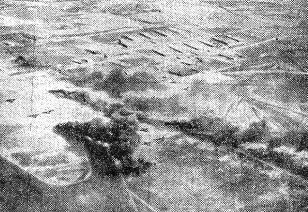
|
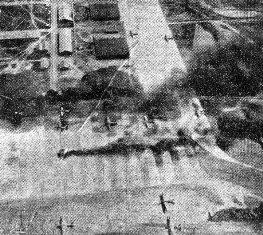
|
Thanksgiving Day when the 14th Air Force made the historic raid which caught the Japs by surprise.
14TH A.F. SUPPORTS CHINESE
JAP TUNG TING LAKE SECTOR POUNDED; RAIDS ON SALWEEN RIVER FRONT
14TH AIR FORCE HQS. - Striking four times at the heart of Japanese installations in the Tung Ting Lake area within the past week, the 14th Air Force continued its support of Chinese ground action. Bombers made three raids on the Salween River front, attacking gasoline and ammunition dumps, rail installations, troop columns and motor convoys. Other raiders hit shipping and installations on the East China Coast, Hong Kong and French Indo-China, as well as Northern Burma.
On Nov. 29, Mitchells destroyed two lighthouses and a radio station on the East China Coast. Warehouses, oil and gasoline storage depots at Swatow were hit. At the same time, Mitchells of the Chinese-American Composite Wing were active over Swatow and Amoy Harbors. Power plants and a radio station at Amoy were bombed and three crane barges were destroyed.
DROP SUPPLIES
The next day, fighters dropped food and ammunition to Chinese troops defending Changteh in the Tung Ting Lake area. After completing this mission, they flew over Ansiang, on the south part of the lake, and destroyed supply barges. Other planes sank five more supply barges along the Irrawaddy River.
B-25's, including those of the Chinese-American Wing, with a fighter escort, attacked the Kowloon and Taikoo docks at Hong Kong on Dec. 1. One 4,000-ton cargo vessel was sunk, and two cargo ships in dry dock totaling approximately 19,750 tons were damaged. One of 12 intercepting Zeros was shot down.
ZEROS BAGGED
Other fighters struck at an airdrome and railroad installations at Don Cuong in French Indo-China. Meanwhile, fighters attacked supply boats near Changteh.
On Dec. 4, Chinese troops in the Tung Ting Lake district were again given aerial support. Four Jap interceptors were probably destroyed and another four were damaged. Two days later, Mitchells and fighters, attacking in the same area, were intercepted by 15 Zeros, two of which were shot down, two probably and three damaged. From all these missions, three planes are reported missing.
|
THURSDAY NOW Thursday, former publication date for the Roundup, will be returned now that the Stateside football season has closed, except for the traditional New Year's Day bowl games. The date was moved to Friday so that grid fans among CBI-landers could read full accounts of their favorite sport. Watch next week for a special feature - a compilation of season's records of all the major elevens. |
CALCUTTA STRUCK IN DAYLIGHT RAID
Attacking in two waves, Japanese bombers this week struck a light blow at the Calcutta area that was strategically unsuccessful, although a few casualties and minor damage was reported.
In Calcutta's first daylight attack - the city suffered night bombings last December and January - two Jap planes were shot down and four others probably destroyed. Ack-ack fire greeted the raiders.
45,000-TON WARSHIP LAUNCHED DEC. 7
PHILADELPHIA - (ANS) - The battleship Wisconsin, was launched on the second anniversary of Pearl Harbor. The 45,000-ton ship is the third of its class (Iowa) launched since the beginning of the war.
FIRST AMERICAN JOINS GURKHAS AS OFFICER
Lt. Frederick J. Kemp, 25, became the first known American to serve with the knife-wielding Gurkhas of mountainous Nepal when he was given a commission in a Ghurka regiment.
He arrived in India a week ago as a corporal. Kemp flew to England at the outbreak of the war and was wounded with the Scots Guards in campaigns in Norway and France.
|
Dec. 7, abroad and at home, came and went without official commemoration, after President Roosevelt vetoed a joint resolution by Congress to set aside the date as Armed Services Day. Still - every Americans blood stirred hotly within him when he recalled pictures like this and others that were taken on that "day of Infamy," two years before, when the Japanese stabbed the nation cruelly in the back at Pearl Harbor.
On Tuesday, each worker on the home front bent his back harder toward the task of supplying the tools of war, while those now carrying the fight to the enemy on many scattered fronts, including the CBI, reiterated their pledge to drive him out of every nook and cranny he now is frantically striving to hold.
The President pointed out, "The day itself requires no reminder and the anniversary should rather serve as a cause for all people to increase their efforts in contributing toward the successful prosecution of the war."
Roosevelt said he thought it "premature" to establish a day, now, to honor those who serve in the Armed Forces . . . "I think it much more suitable that a date can be later selected for this purpose, and future events will ordain a proper date for such commemoration."
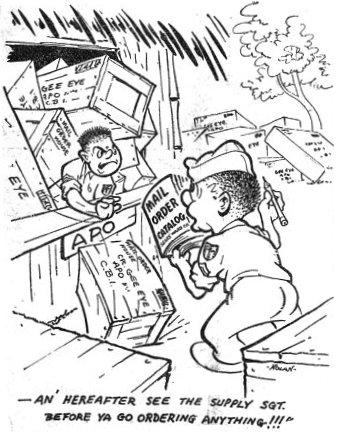
|
WACS, WREN WIN QUIZ SHOW
G.I.'S DEFEATED, DESPITE LATE RALLY,
BY FEMALE BRAIN TRUSTERS
Four WACs and a WREN pitted wit for wit against five G.I.'s this week at Duration Den here in "Little Washington" and, when the verbal smoke cleared, the ladies were the winners by a score of 5-4 in a quiz show, which was tallied on a baseball theme. It was the first time in C.B.I. history that American WACs and enlisted men appeared together in such a program, dreamed up by S/Sgt. Philip Ziegler and Pfc. Sherman Lipstein.
Each team had seven times "at bat," was allowed three misses per inning, and, when answering questions correctly, advanced men on the bases. The WACs scored twice in the first and once in the third, fourth and sixth. G.I.'s were scoreless until the fifth inning, when they put across one run. In the last inning, they staged a desperate rally, scoring three runs. With the bases loaded and one out, the next two contestants went down swinging.
The winning squad was represented by T/Sgt. Elizabeth Osmer, T/3 Aleen March, Sgt. Margo Brewster, T/5 Agnes Huth and WREN Christine Jones, who replaced one of the WACs unable to appear.
The G.I. team consisted of T/Sgt. Dick Harden, S/Sgt. Wally Caveness, Sgt. Bill James, Sgt. Ed McVicker, Pvt. Martin Feldman, and Pfc. Maurice Schoenburn, who pinch-hit for Caveness late in the game.
Throughout the entire show, both players and umpires were alternately cheered and booed. When the G.I. rally came in the seventh inning, the audience was on its feet, shouting itself hoarse.
STARS GLITTER IN CBI FIRMAMENT
Seven Leaders Win Promotion To Generalship
Eight new pairs of stars glittered brightly in the CBI firmament today.
Seven pairs of them perched pertly upon the shoulders of CBI leaders which, up until now, had been adorned by eagles. The eighth made company for William E. R. Covell's first stars, when the recently-appointed Commanding General of the Services of Supply was promoted to major general.
Among the seven fledgling brigadiers confirmed by the Senate are two Theater veterans who made the historic walk out of Burma into India with Lt. Gen. Joseph W. Stilwell during the retreat
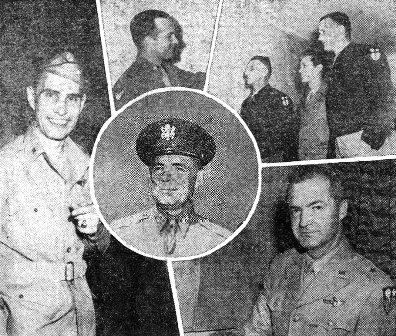 Meet four CBI leaders who are now wearing stars instead of eagles on their shoulders and another (in circle) who was advanced from brigadier to major general. The two-star general is William E. R. Covell, recently appointed CG of the Services of Supply. Grinning, left, is Reuben C. Hood, oldest ASC officer in the Theater in point of service. To his right is Charles B. Stone III, Chief of Staff of the USAAF in India and Burma. Upper left, Frank Dorn, nearest the camera, studies a map with Lt. Gen. Joseph W. Stilwell and his aide, Capt. Dick Young. James W. Spry, lower right, is Chief of Staff of the Army Service Command.
Meet four CBI leaders who are now wearing stars instead of eagles on their shoulders and another (in circle) who was advanced from brigadier to major general. The two-star general is William E. R. Covell, recently appointed CG of the Services of Supply. Grinning, left, is Reuben C. Hood, oldest ASC officer in the Theater in point of service. To his right is Charles B. Stone III, Chief of Staff of the USAAF in India and Burma. Upper left, Frank Dorn, nearest the camera, studies a map with Lt. Gen. Joseph W. Stilwell and his aide, Capt. Dick Young. James W. Spry, lower right, is Chief of Staff of the Army Service Command.
|
Dorn, Stilwell's aide at the time of the hegira from Burma, later Theater Artillery Officer and now Deputy Chief of Staff of Forward Echelon Branch Headquarters, accompanied Uncle Joe from the States, where he served under the Theater commander in the 7th Division and Third Army Corps. Stilwell personally pinned the new general's stars on him, and reports reaching Roundup from China are that the usually voluble Dorn was speechless.
Merrill, now Stilwell's personal representative with the Southeast Asia Command, was only a short jump ahead of the Japs on two other occasions before the hike out of Burma. He was a language student in Japan just before the outbreak of war. Moving to the Philippines meant only a temporary haven, for shortly afterwards the Japs seized the island. He joined forces with Stilwell in Burma, later became Theater G-3, where his performance gained him great respect.
Other new brigadiers include Holcomb F. Lindsay, G-3 of the Chinese Training and Combat Command in China; Eugene Beebe, member of the SEAC planning staff; Charles B. Stone III, Chief of Staff of the USAAF in India and Burma; James W. Spry, Chief of Staff of the ASC, and Reuben C. Hood, ASC in China.
Beebe is the colorful former commander of a heavy bombardment group in China, which struck hard blows at the Japanese.
Hood is the oldest ASC officer in the Theater in point of service, having arrived here shortly after Pearl Harbor. The more romantic and adventurous phases of his pre-Pearl Harbor flying days - dating back to 1929 - found him with the AVG in China. He is a command pilot.
Prior to his coming to the Theater, Spry commanded the Miami Depot, vital link in the Army Air Force supply chain. He graduated West Point in 1922, and was one of the members of his class, first to be assigned directly to the Air Corps, to enter that branch of the service.
'Two Failed To Return'
THANKSGIVING DAY RAID BY B-24'S
By Sgt. AL SAGER Traveling Roundup Correspondent
A HEAVY BOMBARDMENT GROUP IN INDIA - Out here, miles from nowhere, in thatched-roof bashas with no electric lights, with four Red Cross girls as the only vintage of white woman and with very little in the way of entertainment, or P-X supplies, live the officers and men who are hitting the Japs at every opportunity as members of Brig. Gen. Howard C. Davidson's 10th Air Force.
They're leveling off Jap installations and clearing the Burma skies of these buck-toothed, Zero-flying enemy. Yet, the morning paper might read something like this: "Jap communications in Burma were attacked by planes of the 10th Air Force this morning and large fires were observed in the target area. From these operations, two of our aircraft failed to return."
Just a one-column heading somewhere among the goiter ads in the States, yet a story of poignant heroism lies between the lines of that story "two of our aircraft failed to return." Two crews, 20 gallant Americans, went down with those planes. Americans living up to the tradition of the Air Force, "for we live in fame and go down in flame, for nothing can stop the Army Air Corps."
I spent Thanksgiving out here in the flat plains of Eastern India with this 10th Air Force heavy bombardment group. Thanksgiving has come and gone, the traditional roast turkey, cranberries and pumpkin pie weren't present on the table, and the usual holiday festivities were skipped for a bombing raid on the Nips.
Some of the fellows felt as though an egg-beater had been whirled around their insides after watching a score of their buddies lost on this morning's mission, but their spirit was not quenched.
Young Jimmie, one of the lads laid to rest by the Chaplain this afternoon, was all set to go home soon, but just wanted to be a part of the Thanksgiving mission. No conventional M.G.M. gunner was he. Only yesterday, he ordered a new pair of violin strings for his fiddle from Capt. Schroeder, who does the shopping for the fellows who don't get into the big town. Darryl Zanuck never would dream of featuring a long hair in one of his movie scenarios as a tail gunner, but Jimmie was doing the job well, as his record attested.
The first time one of their ships went down, the boys out here felt pretty hard hit. Even rough-and-ready Lt. Lynn Stokes was shaken after that one. But it's been a long, hard road since. Some of the fellows have well over 400 combat hours, and when you crowd your luck, mission after mission, sooner or later "Old Lucifer" is likely to call your number.
But they go right on, blowing up rolling stock here, leveling off installation there, blasting Zeros, bombing tanks, strafing troops! No theater-medal packed commandos or zoot-suit hot shot heroes are these boys from the bushes, just a bunch of right guys from Detroit and Cleveland and Chicago and ...
Famous Author Visits CBI-Land Bases
|
ASC BASE IN INDIA - The history being made by American forces in India will not be easily forgotten. Lt. Col. Yeates Brown is gathering material for his next book, and is touring vital CBI bases for a chapter in Fighting India, scheduled for publication next fall.
India is not new to the colonel. His Lives of the Bengal Lancers was snatched up by Hollywood and given wide celluloid distribution all over the globe. On his present tour, he spends hours in intimate association and conversation with G.I.'s in their mess halls, barracks and shops.
He's shown making notes of S/Sgt. Kenneth W. Martindale's conversation, as Maj. C. M. Taylor stands by.
14 'Eggis' Cinch For Sergeant
CHINA AIR BASE - If you're a G.I. in China and don't like eggs you are just SOL (sure out'a luck).
Breakfast every morning here consists of eggs, or, as the Chinese waiters say, "Eggis." These come in a variety of forms - "fly eggis," "scromble eggis," "eggis fly hard," "eggis fly by one side," etc.
Sgt. Riley G. Montgomery, one of the boys in 1st/Sgt. Ed O'Neill's squadron, likes eggs and no kiddin' about it. He must like them, for every morning he has 14 of them for breakfast.
Montgomery doesn't go in for variety. All 14 of his eggs are "fly hard." He doesn't care much for coffee, that breakfast necessity, but he uses three or four cups to was down his eggs.
Montgomery, a husky lad, is a pretty good all-around eater - breakfast, dinner and supper. It is the usual thing for him to eat six plates of chow at a sitting.
All the great men are noted for their little quirks and Montgomery is no exception. Invariably, he polishes off his meal by downing a couple of plates of soup.
LETTER TO THE EDITOR
BITTER GRIPE AIMED AT HOLLYWOOD FOR FLICKER FARE ON ARMY
YE ED: This is a gripe. The other night, this Central India Air Depot was host to one of the corniest movies we have ever seen, a little slice of tripe called Salute for Three. This was about the adventures of one of our "heroes" returned from the war, whose life was just one USO canteen after another. The attitude of the men toward the picture could be seen from the jeers and cat-calls that came constantly as the movie progressed, and from the beam of flashlights which stabbed the dark as G.I.'s got up and left during various low spots of the "entertainment."
We're complaining not so much about this particular show but the "Hollywood" idea of what the average G.I.'s existence is. Apparently, from the movies, you'd think our life was full of beautiful night club hostesses breathing down our necks, appearances in stage shows and parties at the local canteen, where comely maidens hang from every chandelier. We resent it not only because it's so far from the truth, but also because, with producers churning out this type of junk daily, there's bound to be many damn fools who believe that we actually do live that way.
If some Nazi or Jap propaganda agent had planned to deliberately lower the morale at this particular base, he couldn't have chosen a better weapon. The comments (most of which were unprintable) ran along about the line of "My Gawd, what do they think we are? What a bunch of
NEW CBI-LANDER HONORED
SERGEANT AWARDED SOLDIERS MEDAL
INDIA AIR BASE - For heroism displayed at the Army Air Field at Waycross, Ga., before coming to the C.B.I. Theater, six-foot, 20-year-old S/Sgt. Lloyd F. Gay, of Macon, Ga., this week was awarded the Soldiers Medal at his home fighter-bomber base here.
Gay's medal was awarded for heroism displayed in extinguishing a gasoline fire, though severely burned himself, at the U.S. air field. The citation was made on July 17, but presentation of the award was delayed until this week because Gay was then en route to India. The medal was pinned on him by his commanding officer, Capt. George W. Alexander.
THIS AMERICAN SERGEANT TRAINS FALCONS IN INDIA
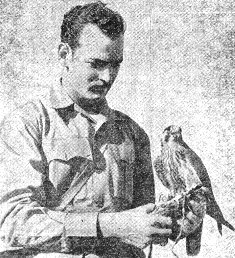
|
Minneapolis-born Sgt. Robert Widmeier is attracting the attention of Indian potentates and maharajahs by his skill at the oldest known sport in existence - falconry.
Falconry, hunting with hawks and falcons, originated in Oriental countries, and it was first brought to Europe by the returning Crusaders. Widmeier's grand-parents brought the sport to the United States with them when they emigrated from Germany, and it is still widely popular in sections of Minnesota.
Because of his love of falconry, Widmeier was pleased when he was sent to India, and he has not been disappointed. He told the Roundup:
"It has been my ambition since I arrived here about a year and a half ago to try and train every species of the Indian hawks and falcons, and this I have done, with the exception of one or two, which I shall train this winter.
"Hawking is carried on in India with as much enthusiasm as ever, despite the war, but the sport is one for the wealthy classes. The maharajahs keep and train the birds on a large scale, employing 20 and 30 falconers for as many birds.
"The sport differs in India very much from falconry as practiced in the United States: Here it is at its highest degree, and falcons are trained and flown at small deer, game, duck, and peal fowl. There is no shortage of hawks and falcons, because they are not hunted and shot purely for sport as in the States.
"Several hundred hawks and falcons are brought in from different sections every year and sold at the Dewali Fair, a religious festival held in Amritsar. It is a gala affair, especially from the viewpoint of a falconer, as nowhere else will he ever see so many types and species of trainable hawks. I attended this fair last year and was amazed at the number of maharajahs and princes who came to purchase birds.
"Falcons are better sporting birds than hawks and offer more of an enjoyable flight since they are in view the majority of the time. Falcons when hunting fly high and look like a swallow or a pin point in the sky. They do their killing by their powers of flight. When they see a bird they 'peel off' like a dive-bomber and come down at a terrific speed in a vertical swoop. Timed to the split second, the falcon hits the quarry, a cloud of feathers scatters in the air, and the victim hits the ground and rebounds from the impact. The falcon then alights beside her fallen prey and waits for her master.
"Trained birds are fairly expensive in India. I inquired the price of an adult female hawk and found it was 400 rupees.
"Hawks do not lack courage, and the size of the game being hunted is no object. They will dash at anything that you or your dog put up, flying right from your fist straight at the game almost with the same effect as a shotgun.
"Flying hawks at pea fowl is beautiful sport to watch, but the major difficulty is that pea fowl are sacred birds - never to be killed. A falconer who is an Afghan prince was hawking with me one day last winter when I flew a hawk at a pea hen. The hawk took and killed it in fine style, but unfortunately we were near an Indian village, and all the inhabitants turned out after us.
"I saw them coming, and I picked up the dead hen, got the hawk on my fist and the prince and I did some fast running to make it to the ferry landing. The villagers were enraged and might have killed us, but we got to the ferry just as it was about to pull out. The Indians on shore did some fancy cursing."

DARK SPECTER There is the oddest magic About a Burmese night, For nowhere else is Heaven So generous with light. Immaculate, the planets Present their brilliancy. The moon bestirs the jungle To quiet activity. A thousand bodeful fancies Attack the mind and eye, As strange companions venture Across the midnight sky. For there, sharp-silhouetted Against the gibbous moon A purposeful, slow bomber Wings southward toward Rangoon. By Sgt. SMITH DAWLESS |
Tull Home; Two Years As CBI-er
CHINA - Chaplain James E. Tull, the first and for 10 months the only Army Air Forces chaplain in China, has returned to the United States after two years overseas service in China and India.
The modern version of the old-time "circuit rider," Tull travelled by plane to minister to the spiritual - and frequently secular - needs of far-flung, khaki-clad congregations of American soldiers at all 14th A.F. China bases. His churches were wherever he held services - in hostels, dining rooms, alert shacks, etc. Music for the services was provided by the chaplain's portable organ and the organist was usually some musical G.I. attending services.
Close to his heart were the war-relief works supported by his congregations. Collections at services were taken informally, with the chaplain asking the men to put anything they wanted to give on a table before they left. The men themselves then quietly found needy victims of the war and the chaplain saw that they received direct aid.
Through him, a number of American soldiers came to "adopt" orphan children driven out of Burma by the Japs. The children found refuge in a China orphanage and, when their plight became known, they were "adopted" by soldiers who pledged themselves to give substantial monthly contributions for their support.
The grandson of a Confederate Civil War veteran and the son of a Southern Baptist minister, Tull also has an uncle, a brother, and three brothers-in-law in the ministry. He was called to active duty as an Infantry officer from the Officers Reserve Corps. He was later transferred to the A.A.F., where for a time he was a group supply officer and adjutant. He was transferred to the Corps of Chaplains in June, 1942.
INDIAN AUTHOR'S BOOK LAUDS U.S.
Inside America, a picture book in which America is shown to the Indian public through the eyes of the camera and the comments of Chaman Lai, compiler-author, is now off the press and is giving the Indian public an extremely favorable picture of life as it is lived in the United States.
Picture illustrate American achievements and aspirations in a wide diversity of fields - from commerce, agriculture, manufacturing, city planning and architecture through politics, social security planning, education and culture to movie stars, sports and bathing beauties. Throughout the work, Lal's comments contrast America of today with India of today, and express the hope that America's Four Freedoms may become an increasing reality in his own native land.
U.S. MEDICAL UNIT TREATING CHINESE
CHINA - Lt. Gen. Joseph W. Stilwell's headquarters has revealed that a U.S. Army Medical Unit has arrived in a mountain outpost in the interior to give American medical treatment to Chinese soldiers for the first time.
Six such units will be set up at strategic points in the near future, three of them under Maj. R. H. Johnson, of Clarksville, Ark., and others under Lt. Col. Virgil Fish, of University City, Mo.
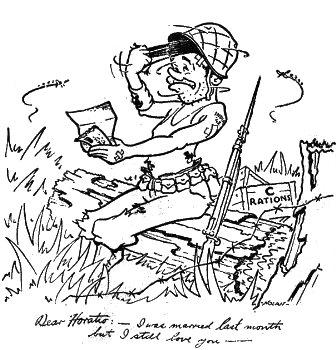
|
LETTERS
STATESIDE WRITERS SHOULD EXERCISE CAUTION
YE ED: Waggish S/Sgt. Charles D. Sterling's letter was tossed on Ye Ed's desk only a minute ago and accelerated him promptly toward his typewriter.
Sterling, who has been in CBI-land so long that he thinks a night club is a stick carried after dark by MP's, posed a subject worthy of mention. Go to the head of the class, sarge.
The sarge's note concerns letters from home, and he cites a few classic examples which have been received in his neck of the woods. There was, for instance, the deeply apologetic note which filled one G.I. with overwhelming delight as he read: "Sweetheart, I was married last month, but I don't know why I did it, I still love you." Another one which also caused great merriment said: "Joe Smalsch just went up from corporal to tech sergeant at the camp here near home. How come you're still a private first class?"
And paroxysms of uncontrolled laughter shrieked through the base when an epistle asked a jive-loving G.I. how he liked the Eighteenth Street Crawl, currently topping the Hit Parade. "We might hear it in a couple of years - if we're lucky," caustically writes Sterling, dipping his pen in acid.
A nomination for oblivion was unanimously voted by the sergeant's unit to a civilian buddy on the home front who asked a CBI-lander how his current love affairs are progressing.
One chap who had just lost his last button to the dhobie-wallah was seen shaking like an aspen in a 100-mile-an-hour gale after a letter from his anxious mother asked him whether he was getting enough soap with which to wash his clothes.
And a boy's best friend is NOT his mother when she writes she cooked his favorite meal for Charlie, the airplane worker next door, who "seemed to enjoy it immensely."
These sort of letters must be quelled immediately as sabotaging the war effort in CBI-land. Why, only the other day Ye Ed received a morale-shaker from a girl friend in which she said she was working like mad with the USO to bolster the spirits of the poor, dear, underprivileged lads at a camp near her home who were able to get into town just three or four nights a week and received two-week furloughs only a couple of times a year.
The Roundup advocates that the Theater censors open all mail coming in from the States and burn letters of the foregoing type. And it further stipulates that directives be sent to the United States suggesting the types of correspondence that CBI-landers would be pleased to receive.
Any soldier who has just lost his girl friend to a 4-F would enjoy getting a note like this: "You're lucky as Hell you didn't marry Petunia. She's a termagant around the house. Her figure is starting to resemble a potato sack. And Joe, the dumb cluck who married her is already up to his neck in debt."
Or a morale booster could dwell on the heart-wrenching plight of Johnny, the fellow down the street turned down by the Army because of pink toothbrush, who "lost his ration book and is being worked so hard at the shipyards that he has lost 20 pounds."
No promotions for Stateside G.I.'s should be mentioned. Instead, glowing letters should be sent when friends are busted, replete with all the gory details.
We could expand this for several more pages. But you get the general idea, don't you?
The C.B.I. Roundup is a weekly newspaper published by and for the men of the United States Army Forces in China, Burma, and India, from news and pictures supplied by staff members, soldier correspondents, the United Press, and the War Department. The Roundup is published Friday of each week and is printed by The Statesman in New Delhi, India. Editorial matter should be sent directly to Lt. Floyd Walter, Rear Echelon Hq., U.S.A.F., C.B.I., New Delhi, and should arrive not later than Monday in order to make that week's issue. Pictures must arrive by Sunday and must be negatives or enlargements. Stories should contain full name and organization of sender.

DECEMBER 10, 1943
Original issue from the collection of C.B.I. Roundup Correpondent Al Sager, shared by CBI veteran Dave Dale.
Copyright © 2006 Carl Warren Weidenburner
TOP OF PAGE PRINT THIS PAGE ABOUT THIS PAGE SEND COMMENTS
PREVIOUS ISSUE CLOSE THIS WINDOW NEXT ISSUE

